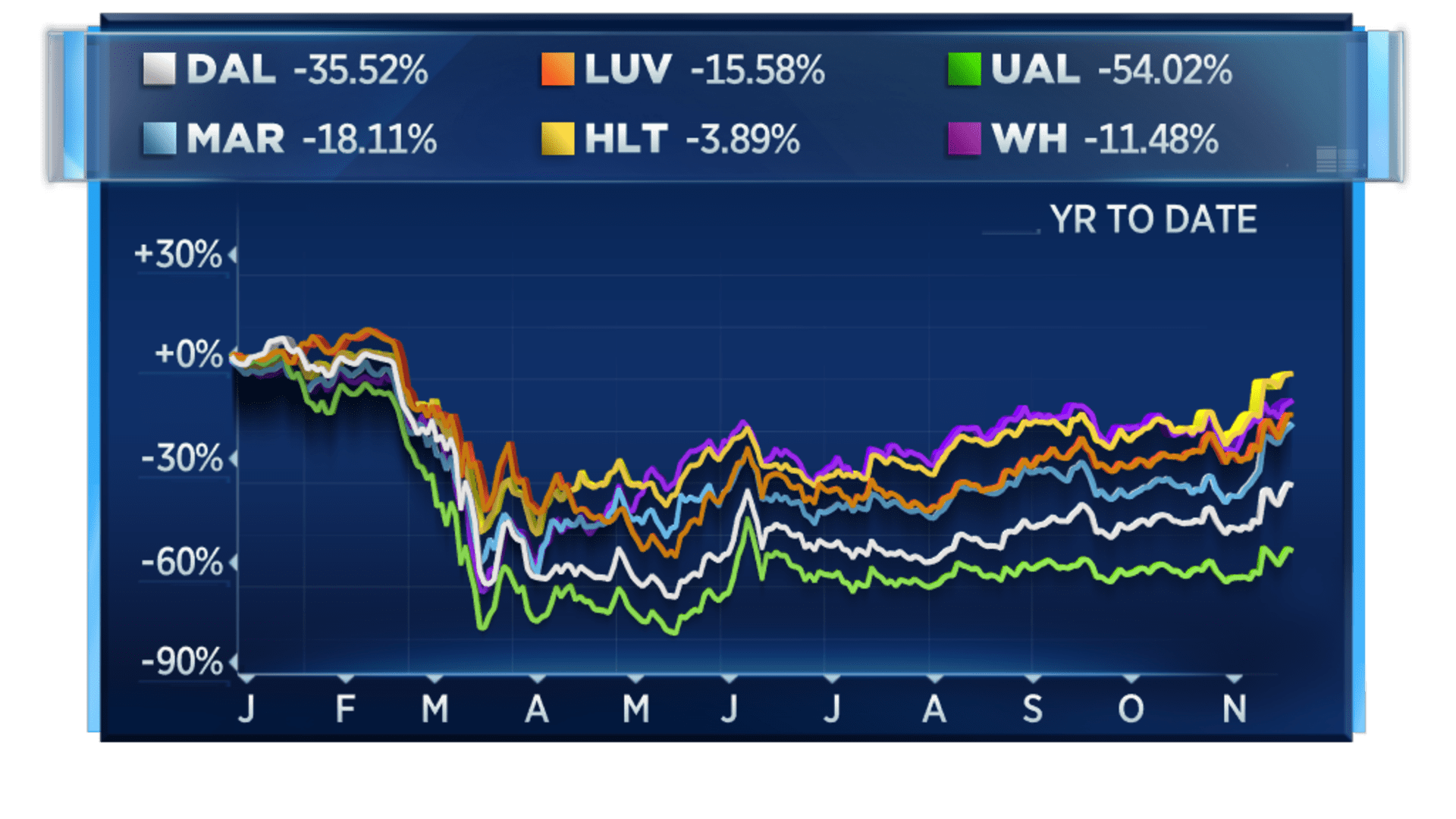
- Airbnb's third-quarter revenue dropped 18% from a year earlier to $1.34 billion because of the pandemic.
- While that's a big slump for a company going public, it's not nearly as steep as the decline many other travel businesses have seen.
- Airbnb is among a group of consumer internet companies planning to go public before year-end.
Airbnb is in the challenging position of preparing to go public amid a slump in revenue. But relative to the rest of the travel industry, the company is thriving.
In its IPO prospectus on Monday, Airbnb said that third-quarter revenue dropped 18% to $1.3 billion. Compare that to food delivery company DoorDash, which said in its filing on Friday that sales in the latest quarter more than tripled. Among the year's hottest IPOs to date, software maker Snowflake's revenue more than doubled in the quarter before it went public, while gaming company Unity grew 43%.
Unlike those companies, and others that hit the public markets in 2020, Airbnb was badly hurt by the coronavirus pandemic. Coming into the year sporting a $35 billion valuation and soaring demand from investors, Airbnb was slammed when travel ground to a halt, which not only caused business to deteriorate but also forced the company to reimburse travelers for cancelations.
Along with airlines, hotels and online travel agencies, Airbnb had a disastrous second quarter. Revenue plummeted 72%, and the company laid off 25% of its workforce, slashed its valuation and raised about $2 billion in high-interest debt.
While other parts of the industry are still in shambles, Airbnb is bouncing back. Even with the third-quarter revenue decline, the period was Airbnb's second-biggest ever, behind only the the same quarter from 2019. And because the company slashed its sales and marketing costs by 74%, Airbnb turned a profit in the quarter of $219 million.
Money Report
Airbnb's customers had to change their ways.
People weren't traveling so much to big cities like New York, Chicago and Los Angeles, but starting in the summer, they were looking for cabins by the lake or in the mountains to spend a holiday weekend or as an escape for a month or two of remote work.
"They decided to get in their cars and travel close to home, often staying in small towns and rural communities," Airbnb's founders wrote in their letter to prospective shareholders in the filing. "Our business rebounded faster than anyone expected, and it showed that as the world changes, our model is able to adapt."
Compare that to online travel giant Booking Holdings, which earlier this month reported that third-quarter revenue dropped 48% as lockdowns and travel restrictions, "continue to impact travel in the near-term," said CEO Glenn Fogel. Expedia fared even worse, with sales plunging 58% in the period and the prospects of a "prolonged and bumpy path to recovery," said CEO Peter Kern.
Airlines and hotels are getting crushed. Delta reported a 79% revenue drop in its latest quarter, while United's sales plunged 78% and Southwest's plummeted 68%. On the hospitality side, Marriott's revenue fell 66%, Hilton dropped by 61% and Wyndham Hotels declined by 40%.

Across the board, travel companies have emphasized the industry's bounce off the lows from March and April, the early months of the pandemic. Christopher Nassetta, Hilton's CEO, said in the company's earnings statement this month that, "While a full recovery will take time, we are well positioned to capture rising demand and execute on growth opportunities."
The fourth quarter could be ugly for all of them, including Airbnb. The U.S. is recording close to 150,000 new coronavirus cases each day, more than double the rate from a month ago, and infectious disease experts are advising people to avoid large family gatherings over the Thanksgiving and Christmas holidays. It's increasingly looking like only a Covid 19 vaccine reaching the masses will return the economy to a more normal state.
Airbnb isn't hiding the risk. The company references Covid or coronavirus 219 times in its prospectus and said that, because of the latest spike, it expects a steeper year-over-year drop in booking volume in the fourth quarter than in the third.
Here's how Airbnb leads its risk factors section:
"The COVID-19 pandemic and the impact of actions to mitigate the COVID-19 pandemic have materially adversely impacted and will continue to materially adversely impact our business, results of operations, and financial condition."
Still, Airbnb has at least shown that, in a world where people are traveling to more remote areas and finding creative ways to work from anywhere, the company has a narrative that's more optimistic than its industry peers.
Rather than trying to fill empty hotel rooms or keep middle seats open on planes, "Airbnb's offerings are well suited to adapt to this changing dynamic," the company says.
WATCH:






